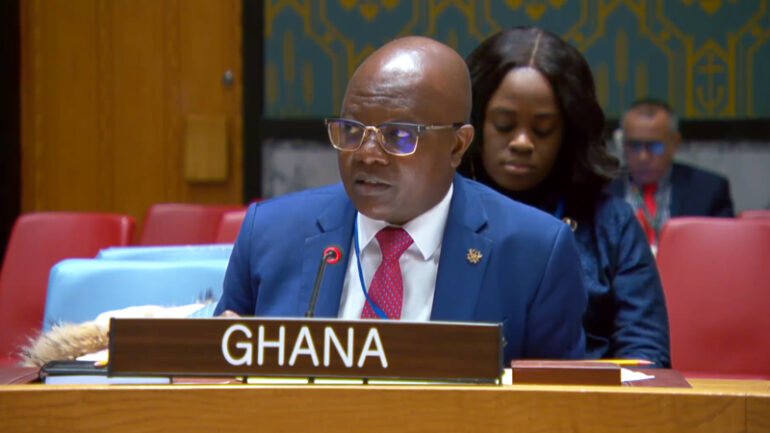United Nations Security Council meeting of the on the launch of a military Satellite by the DPRK

Mr. Jeswuni Abudu-Birresborn
Minister-Counsellor
Ghana Permanent Missionto the United Nations
New York City November 27, 2023
I thank ASG Khaled Khiari for his briefing to the Council and welcome the participation of the Permanent Representative of the Republic of Korea.
Mr. President
While the Council’s attention has been focused elsewhere, the DPRK has continued the development of its capabilities in breach of multiply security council resolutions.
Ghana is gravely concerned by the DPRK’s launch of a military satellite last week, the third such launch in the last six months. These acts by the DPRK are against its international obligations as expressed in multiple United Nations Security Council resolutions. We deplore the latest launch, which has come on the back of several others, and call on the DPRK to fully comply with its international obligations under all relevant Security Council resolutions by refraining from further launches with ballistic missile technology.
Mr. President,
Anti-proliferation mechanisms that once served as guard rails by keeping nuclear ambitions in check are failing. The North Korean nuclear impasse is part of this trend. We continue to see the erosion of trust and the spike in political polarization on this file, which has paralyzed the Council and rendered it unable to act.
After years of very little or no progress on this file, we must resist the temptation of doing nothing because the cost of inaction is far greater than the cost action. In this regard, we continue to urge the international community to implement pragmatic measures while simultaneously pursuing long-term engagement within a multilateral framework arrangement to restrict DPRK’s weapons development programme.
More specifically, we would like to share some priority areas of global action.
First, at the heart of pragmatic solutions is the urgent need to rebuild trust, solidarity and mutual respect through dialogue and diplomacy, which considers the concerns of all members. After three years, the DPRK is showing signs of reopening. Recent bilateral engagements with its neighbours and with this Council are critical first steps in trust and confidence building. Diplomatic channels of communication between the DPRK, its neigbours and other stakeholders through regular in person meetings should be prioritized as pandemic restrictions are gradually lifted. We continue to urge the DPRK to expedite action on the return of the UN country team as well as other aid agencies.
Second, sanctions are important in the toolbox of the Security Council for the maintenance of international peace and security. Sanctions are, however, not an end in themselves. While we commend the 1718 Committee for its proactive approach in addressing the humanitarian situation in the DPRK within the framework of exemptions in the existing sanctions, we must also address the unintended consequences of sanctions on the DPRK in a swift and all rounded manner. It is also important to evaluate thoroughly the DPRK sanctions regime to better understand the gaps that have enabled sanctions override and the facilitation of its nuclear weapons programme without hindrance.
Third, a comprehensive multilateral and regional security solution to the issues on the Korean peninsula is necessary. As it is often said, regional solutions to regional problems. Over the years however, conflicting national interest among regional actors have hindered successful and coordinated multilateral security efforts to resolve the issues on the Korean peninsula. It is time for regional actors to lead the effort at addressing the security and developmental challenges of their region.
In conclusion Mr. President, we recognise that the threat posed by the DPRK to international security is serious and growing. As a Council, we must find better ways of sustaining the Council’s unity on this matter and pursuing long-term engagement within a multilateral framework arrangement to restrict DPRK’s weapons development programme. Where difficult options must be embraced, we should be bold to accept them because time may not be on the side of this Council if we wait too long. Our responsibility is to steer the region away from the path of catastrophe and preserve the peace and lives on the Peninsula.
I thank you for your attention.
